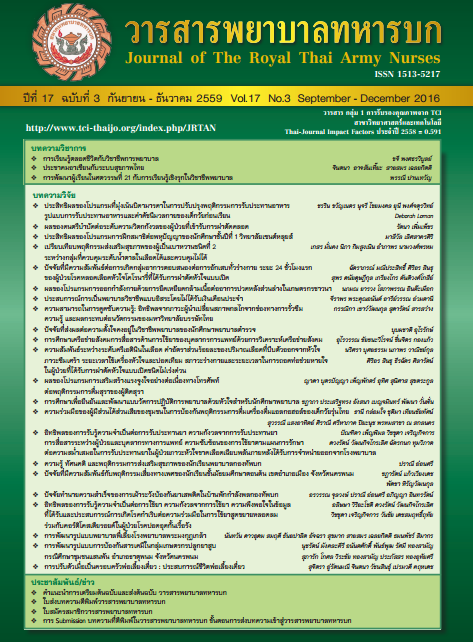ความร่วมมือของผู้มีส่วนได้ส่วนเสียของชุมชนในการป้องกันพฤติกรรม การดื่มเครื่องดื่มแอลกอฮอล์ของเด็กวัยรุ่นไทย
Keywords:
เด็กวัยรุ่น, กลยุทธ์การป้องกันพฤติกรรมการดื่มเครื่องดื่มแอลกอฮอล์, young people, the strategies to prevent the alcohol consumption behaviorAbstract
ช่วงวัยเด็กจนถึงช่วงวัยรุ่น เป็นช่วงวัยที่เรียกว่าเป็นช่วงหัวเลี้ยวหัวต่อที่ต้องการเลียนแบบเพื่อสร้างแบบแผนพฤติกรรมที่เป็นเอกลักษณ์เฉพาะตนและส่งผลต่อเนื่องไปถึงวัยผู้ใหญ่ การวิจัยเชิงคุณภาพเพื่อค้นหากลยุทธ์ในการป้องกันพฤติกรรมการดื่มเครื่องดื่มแอลกอฮอล์ของเด็กวัยรุ่นไทยโดยใช้การมีส่วนร่วมของผู้มีส่วนได้ส่วนเสียในชุมชนจากประสบการณ์ตรง การเก็บรวบรวมข้อมูลใช้การประชุมกลุ่มย่อยและการสัมภาษณ์เชิงลึกเพื่อระดมความคิดเห็นแบบการมีส่วนร่วม กลุ่มตัวอย่างประกอบด้วย ผู้แทน นักเรียน ผู้แทนผู้ปกครอง อาจารย์ฝ่ายปกครอง เจ้าหน้าที่ด้านสาธารณสุข ผู้นำชุมชน และเจ้าหน้าที่ตำรวจ การวิเคราะห์ข้อมูลเชิงคุณภาพใช้วิธีการวิเคราะห์เนื้อหาและธีม (Thematic analysis) นอกจากนี้ยังมีการดำเนินการเพื่อความน่าเชื่อถือได้ของกระบวนการดำเนินการและการวิเคราะห์ผลอย่างมีประสิทธิภาพผลการวิจัย การใช้กระบวนการวิจัยรูปแบบการวิจัยเชิงปฏิบัติการแบบมีส่วนร่วม (Participatory Action Research)พบว่า เด็กวัยรุ่นดื่มแอลกอฮอล์ตั้งแต่อายุยังน้อยและอยู่ชั้นประถมศึกษาซึ่งเป็นพฤติกรรมที่ไม่เป็นที่พึงพอใจ ส่วนกลยุทธ์เพื่อป้องกันพฤติกรรมการดื่มเครื่องดื่มแอลกอฮอล์ สามารถดำเนินการได้ 3 ระดับ คือ 1) การป้องกันในระดับครอบครัว 2) การป้องกันในระดับโรงเรียน และ 3) การป้องกันในระดับชุมชน ซึ่งการป้องทั้ง 3 ระดับนี้ กลุ่มผู้ให้ข้อมูลมีความเห็นตรงกันว่าเป็นการป้องกันที่สำคัญและทุกคนต้องมีการดำเนินการอย่างต่อเนื่องในลักษณะเครือข่าย จะดำเนินการเพียงโดยลำพังไม่ได้
The Collaboration of the Stakeholders in Community to Prevent the Alcohol Consumption Behavior of Young People in Thailand
From childhood to adolescence is very important period that young people would like to copy and set the self-identity and refer to the adulthood. The qualitative approach aimed to examine the strategies to prevent the alcohol consumption behavior of young people in Thailand using the participation of the stakeholders in the community and sharing their experiences. Focus group and in-depth interviews were used to collected data. The examples were students, parents, advisory teachers, healthcare providers, a community leader and a policeman. Content analysis and thematic analysis were used to analyze the qualitative data. Moreover, the trustworthiness was employed to ensure for the research process and qualitative approach. The findings of the study indicated that young people started drinking at an early age while they were in primary school, and it was unpleasant behavior for their parents. However, the stakeholders also defined the strategies to prevent the alcohol consumption behavior within 3 level including 1) the prevention strategies in family level, 2) the prevention strategies in school level and 3) the prevention strategies in community level. As posted messages, the stakeholders recommended that the prevention strategies in 3 levels are very important and should be processing with the collaboration of the network in the community. It cannot be completed by itself, so people in community have to help each other.
Downloads
Downloads
How to Cite
Issue
Section
License
บทความหรือข้อคิดเห็นใดใดที่ปรากฏในวารสารพยาบาลทหารบกเป็นวรรณกรรมของผู้เขียน ซึ่งบรรณาธิการหรือสมาคมพยาบาลทหารบก ไม่จำเป็นต้องเห็นด้วย
บทความที่ได้รับการตีพิมพ์เป็นลิขสิทธิ์ของวารสารพยาบาลทหารบก
The ideas and opinions expressed in the Journal of The Royal Thai Army Nurses are those of the authors and not necessarily those
of the editor or Royal Thai Army Nurses Association.






